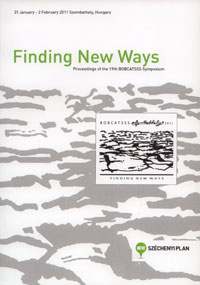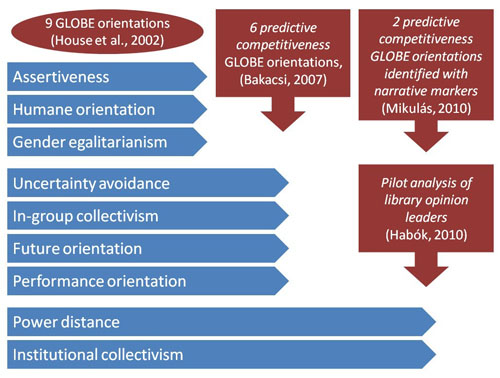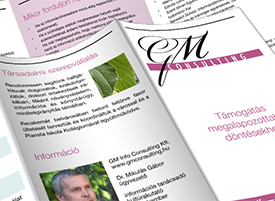Measuring predictive competitiveness of library managers from their narratives – a new approach
 Gábor Mikulás, GM Consulting, Kecskemét, Hungary and
Gábor Mikulás, GM Consulting, Kecskemét, Hungary and
Lilla Habók, Department of Librarian and Information Science, Eötvös Loránd University, Budapest, Hungary
In: p. 230-237, Finding new ways : proceedings of the 19th BOBCATSSS Symposium. University of West Hungary Press, Sopron, 2011.
The purpose of this paper is – To predict competitiveness – to study the narrative patterns
The aim of this paper is demonstrated in two phases:
Phase 1.: understanding the narrative patterns for predicting competitiveness
Phase 2.: apply the findings in narratives of library managers (opinion leaders).
As a background, it uses the methodology of the international GLOBE-project which assesses 9 cultural orientations. Some of them predict competitiveness within the countries and in organizations. The heads of organizations have a strong influence on their institutions, and their narrative contains the hidden patterns of human behavior, which forms the cultural orientations. This paper describes the way of identifying competitive cultural orientations within the narratives of the heads of organizations in the frame of four case studies. Based on this procedure, it also proves that the competitiveness analysis can also be used for the narratives of library opinion managers.
Background
Phase 1. The organizational culture is “shared motives, values, identities, and interpretations or meanings of significant events that result from common experiences of members of collectives and are transmitted across age generations”. (House et al. 2004) In the last 30 years, several scientists established their methodology for mapping the cultural orientations. The GLOBE-project (Global Leadership and Organizational Behavior Effectiveness) identifies different levels in nine cultural dimensions based on a questionnaire given to middle level managers of organizations (House et al, 2002) on the level of nations and organizations as well.
Bakacsi (2007) marked 6 of the 9 cultural orientations which predicatively specify the competitiveness of countries (see figure 1.). (Competitiveness, definition of the World Competitive Yearbook: the competitiveness analyses, how the countries and the companies manage their whole amount of competences aiming to reach wealth and profit. Garelli, 2005) According to her research – in which the results of the GLOBE countries were correlated with country-level competitiveness index stated 10 years later – it can be stated that the predictive competitiveness correlates to the national level descriptive values
- of the uncertainty avoidance, institutional collectivism, the performance orientation and the future orientation positively
- and of power distance index and the in-group collectivism (being proud of the own group) negatively.
This experience partly correlates, partly does not contradict the result of other methodologies.
Figure 1. Among the 9 cultural orientations of GLOBE, 6 predictive to the competitiveness and 2 of them could be identified via narrative analysis.
The definitions of these orientations are demonstrated in table 1.
| Orientation | Definition |
| Power Distance | (1) … is the degree to which members of an organization or society expect and agree that power should be stratified and concentrated at higher levels of an organization or government. (2)… is defined as the degree to which members of an organization or society expect and agree that power should be unequally shared. |
| Uncertainty Avoidance | (2) … is the extent to which members of an organization or society strive to avoid uncertainty by relying on established social norms, rituals, and bureaucratic practices. (2) … is defined as the extent to which members of an organization strive to avoid uncertainty by reliance on social norms, rituals, and bureaucratic practices to alleviate the unpredictability of future events. |
| Institutional Collectivism | (1) … is the degree to which organizational and societal institutional practices encourage and reward collective distribution of resources and collective actions. (2) … is the degree to which organizational and societal institutional norms and practices encourage and reward collective distribution of resources and collective actions. |
| In-Group Collectivism | … is the degree to which individuals express pride, loyalty, and cohesiveness in their organizations or families |
| Performance orientation | … is the degree to which an organization or society encourages and rewards group members for performance improvement and excellence. |
| Future orientation | (1) .. is the degree to which individuals in organizations or societies engage to future oriented behaviors such as planning, investing in the future, and delaying individual or collective gratification. (2) … is the degree to which individuals in organizations or societies engage to future oriented behaviors such as planning, investing in the future, and delaying gratification |
Table 1. Cultural orientations (House et al., 2002)
The questionnaire of the research asks about the experienced (as it is or descriptive) and the perceived (normative) state separated, referring both on national and organizational levels. In this way similar themes (should be or questions) were raised in 2×2 variations.
According to the research relevant management science it can be assumed that due to the long distance refine the culture of the leader and the organization tends to become the same or very similar to each other. Also the literature search results let us presume that the competitiveness cultural orientations are the same on national (societal) and on organizational level.
Phase 2. People discussed the organizational culture of librarians in several contexts. Based on Hofstede’s model, Pors and Johannsen (2003) indicated that in the Scandinavian libraries the power distance is small, the orientation to individualism is high, the feministic culture is characteristic and they deal with insecureness. Kaarst-Brown et al. (2004) found the most of the library-types to be identified as the same as the clan-culture. Mikulás (2005) empirically suggested by taking the model of Hofstede into consideration that Hungarian libraries have significant power distance, are highly collectivistic, feministic and avoid insecureness. Until now there hasn’t been literature about the GLOBE cultural orientations examined in connection with the librarians, as well as about the narrative identification based on that by Habók (2010).
Methods used
Phase 1. Aiming the identification of the patterns of cultural orientations in the narratives of head of organizations, the questionnaire of GLOBE was filled out by the middle managers of four organizations. All the organizations had some kind of experience with information processing, and had minimum 15 middle managers. With this questionnaire the cultural orientations of the organizations could be estimated with a quantitative method. The chief executives had a semi-structured interview with answers in four fields: 1 company history, 2 their own careers, 3 plans of the organization, 4 two examples of personal success and / or challenge. This text provided the corpus of the qualitative narrative analysis.
Several qualitative methods are able to extract hidden or partly hidden contents from texts. The texts of interviews were tested with two (plus one) narrative analyzing processes:
- Content analysis (qualitative) with two independent encoders with a third party judge. – Without having a comprehensive narrative cultural tool, an own methodological framework was developed.
- Motivation research (qualitative) – It was derived from the motivation system described by Kapitány and Kapitány (1993) in the texts.
- Additional analysis: measuring the appearance of some narrative themes, counting some phrases (quantitative), text pragmatics (qualitative).
The use of all these three techniques provides strong data
- on the one hand for the description of organizational culture of the tested organizations
- on the other hand, in triangulation with quantitative GLOBE-results, it could be specified: which cultural orientations can be identified with good effect with the use of narrative tools.
The research is approached the competitive orientations from three (plus an additional analysis) directions. Correlation research included the GLOBE—content analysis, the GLOBE—motivation research and the content analysis—motivation research. Narrative patterns of power distance and institutional collectivism could be identified.
Phase 2. Based on the findings of Phase 1., a new research is aimed at opinion leaders (managers) of Hungarian libraries who were in some sort of management position. After identifying the five main opinion leaders, 2×10 minutes unedited video samples – speech segments – of the target persons were transcribed in which the patterns of power distance and the institutional collectivism were searched (see Graph 1) by two independent encoders and a chief encoder. As a result, the codes of the two cultural orientations were quantified and the sample texts of library opinion leaders were ranked according to competitiveness.
Findings – Identified patterns of competitiveness and their presence in the narratives of library managers
Phase 1. – Narratively identified predictive cultural orientations.
The narrative signs of power distance used by the interviewee suggest that he/she
- prefers power distance on organizational and national levels as well
- does not experience high power distance on national level.
Such a pattern – in comparison with the patterns of competitiveness specified by the research of Bakacsi – predicts lower competitiveness. Put simply: those who use the motives of power distance in their narratives a lot, intend to keep the power distance maintained, however this attitude let their own competitiveness decline.
Analyzing the patterns of institutional collectivism, we might draw the following interrelations:
- In the narratives of those, who speak about wider understanding and cooperation find them less important nowadays and in the future. They think a narrower perspective also in their wider community.
- Those, who speak about wider understanding and cooperation relating to their plans and future are interested in these also in their wider and narrower atmosphere.
This result – comparing it to the pattern of competitiveness of Bakacsi – predicts lower competitiveness in the themes of past, and predicts an increased competitiveness in the themes of future.
The conducted analyses (GLOBE, content analysis, motivation research add additional analysis) offered the possibility to give suggestions also to the inspected organizations of their organizational development.
Phase 2. Based on the review and the comprehension of the five examined person’s transcribed video, the motive of power distance was to observe, however the institutional collectivism was common at each (see: Figure 2). The two orientations can be studied independently, as a possible base of coaching or organizational development. From the aspect of the competitiveness we can describe the case as significant, when there was no power distance or its value is lower than the institutional collectivism’s.
Figure 2. Predictive competitive orientations in sample narratives of library managers (opinion leaders)
Importance and interest of the study
Due to the nature of the case study of Phase 1., (small numbers of items) the results should be treated with caution, however, several well-known patterns from literature are drawn by them. Although the method is new and further tests shall be conducted on bigger narrative corpus, it seems to be a tool of evaluating also librarian manager’s attitude. As it has a significant impact on the institution they control, the competitiveness evaluation refers to the perspectives of the libraries, library organizations, associations and governmental bodies.
Value of paper – Possible use of findings
There were no practiced methods to extract predictive competitiveness cultural orientations from executive’s narratives. The research results may expedite several practical works. E. g.:
- Organizational development within the consulting industry. The research refines the diagnosis of organizational cultural orientations which influence the competitiveness. The main instruments of this work are the questionnaires and the interviews. Both the questionnaire and the narrative data patterns promote the organizational diagnosis and make it more exact.
- Evaluation of personal narratives. Although the subject of the manager’s narrative shall be taken into account, the narrative samples may be a good base of identifying predictive competitiveness of library managers and the organizations they manage.
- Human resource consulting. Mapping the cultural orientations with interview method contributes the optimization of the working team combinations. It also promotes the proper suiting or pairing of persons and working tasks.
- Head hunting- and recruitment in general. The selection of the worker fits to the organization’s purposes and existing culture enhances the efficiency of the organization. The content analysis of the recruitment interview puts forward the selection of the person having a competitive culture fits to the aims of the organization.
- Credit rating process. The credit rating in the banks is expended by content analysis. If the applicant’s financial data and business plan and the content analysis of the applicant’s interview during the decision procedure show the same direction the security of crediting process increases. In case of controversial directions, further data analyses have to be involved. This enhances the security of credit rating process.
- Information consulting. The traditional company information may be completed by narrative analysis of the head of the company, with the emphasis on predictive competitive aspect. This possibly raises the value of the information service. Such an information package may contribute the selection of the proper subcontractor, business partner or predict the competitive potential of competitors in the future.
Bibliography
- Bakacsi (2007) Kultúra és gazda(g)ság – A gazdasági fejlődés és fejlettség és a GLOBE kultúraváltozóinak összefüggései [Culture and economy/wealth – The correlations of economic developing and development and GLOBE cultural dependents] / Bakacsi Gyula. In: Vezetéstudomány 38 (2007) Különszám p. 35-45
- Habók (2010) Magyar könyvtárak a sajtóban : Versenyképesség kimutatása könyvtári videókból : Szakdolgozat [Hungarian libraries in the press : Competitiveness from librarian videos : Graduation project] / Habók Lilla. – ELTE. – 68 p.
- House et al. (2004) House et al.: Culture, leadership, and Organizations. The GLOBE study of 62 societies (Vol. 1.) Thousand Oaks, CA : Sage, 2004
- House et al. (2002) House, R., Javidan, M., Hanges, P., Dorfman, P.: Understanding cultures and implicit leadership theories across the globe: an introduction to project GLOBE. In: Journal of World Business 37 (2002) p. 3-10
- Garelli (2005) Competitiveness of nations : The fundamentals : World competitiveness Yearbook / Stephane Garelli. – Lausanne : IMD, 2005
- Kaarst-Brown et al. (2004) Organizational culture of libraries as a strategic resource / Michelle L. Kaarst-Brown, Scott Nicholson, Gisela M. von Dran, Jeffrey M. Stanton. In: Library Trends 53 (Summer 2004) 1. p. 33-53
- Kapitány—Kapitány (1993) Rejtjelek [Cyphers] / Kapitány Ágnes, Kapitány Gábor. – Szorobán : Budapest, 1993. – 247 p.
- Mikulás (2005) Szervezeti kultúra az információs és könyvtári szolgáltatásban – keretrendszer és tapasztalatok [Organizational culture in the information and library services : framework and experiences] / Mikulás Gábor. In: Könyvtári Figyelő, 15 (2005) 3 p. 559-575 http://www.gmconsulting.hu/2005/08/szervezeti-kultura-az-informacios-es-konyvtari-szolgaltatasban-%E2%80%93-keretrendszer-es-tapasztalatok/
- Pors—Johannsen, 2003 Attitudes towards internationalisation in the library sector: the case of Danish librarians and library managers / Niels Ole Pors, Carl Gustav Johannsen. In: New Library World 104 (2003) 1190/1191 p. 278-285
Website of Phase 1.: http://www.gmconsulting.hu/inf/cikkek/312/index.php







